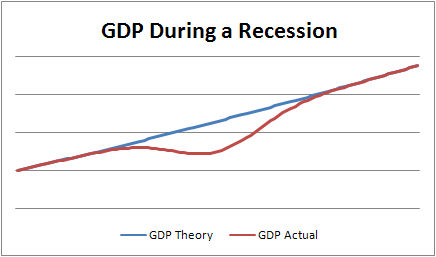This is the 2nd post of my amateur exploration of the reasoning behind the stimulus bill. I think I do okay writing about microeconomic issues, but this is my first real attempt at discussing macroeconomics. There’s a distinct possibility that some of this is very badly wrong, or worse, so badly written that it’s not even wrong.
My last post explained what happens to Gross Domestic Product during a recession. Normally, our GDP should be steadily increasing as indicated by the theoretical blue line in the graph below, but instead it takes an unexpected dip like the red line below, taking our standard of living with it.
 This happens without any obvious cause such as a disaster that destroys our productive capacity. As I explained, it seems to happen out of some sort of collective madness which just makes us stop working.
This happens without any obvious cause such as a disaster that destroys our productive capacity. As I explained, it seems to happen out of some sort of collective madness which just makes us stop working.It turns out that’s actually pretty close to the explanation that many economists accept. It goes something like this:
Suppose you’re an ordinary laborer in the normal economy, just working for your paycheck, saving a little, and spending the rest on the usual sorts of things—food, shelter, clothing, transportation, health, entertainment, and so on.
Then one day something happens that makes you think your income is going to take a dip in the next year or so. Maybe your company announces it’s going to close the plant you work in, or maybe you’re in sales and you lose your biggest customer. Whatever it is, something makes you think your income is going to decline, possibly all the way to zero, in the near future.
The obvious, sensible, rational response is to start trying to save enough money now to get you through the rough times ahead. You do this by cutting back expenses. You buy fewer video games, eat out less, rent from netflix instead of going to the movies, cancel the Hawiian vacation you had planned, and put off replacing your old car. You take the money you save, and you put it in the bank.
You are not the only person affected by your decision to cut back expenses. All the people you bought from will feel the pinch too. Your decision (at least in theory) reduces the income of the clerks at the video game store, the servers and chefs at the restaurants you patronize, the staff at the movie theater, the airline and hotel you would have used for your trip, and your car dealer and the employees of the plant that makes the car.
These people, facing the decline in income, make cutbacks of their own, passing the misery on to the people they buy stuff from, and so on, and so on. Through this multiplier effect, your change in spending habits has a small but far-reaching effect on the economy around you. Likewise, changes in other people’s spending habits have a small but real effect on your income.
On the other hand, these effects are somewhat mitigated by the banks. When people save their money in a bank, the bankers promptly lend it out to other people who, unlike the savers, are trying to increase their spending by borrowing money. And just as your cutbacks were multiplied into your economic sphere, their increase in spending provides money to the people they buy from, allowing them to spend more as well. Most of the time, spread out over the millions of people in our economy, it all works out about the same.
The problem comes when, for some reason, everybody becomes worried about their future at the same time—perhaps because of a sudden shock in oil prices, or a stock market crash, or a wave of bank failures—so everybody tries to save money by cutting back on expenditures at the same time. Since everybody’s expenses affect everybody’s income, the decision to cut back spending leads to a nation-wide reduction of income, also known as a recession.
The banks are no help because with everybody saving, nobody wants to borrow money, then when the recession hits, nobody has money to put in the bank. (In the current crisis, the credit markets have frozen up, so nobody is lending money that would boost consumption.)
To make matters worse, everybody can see what’s happening. Even people who hadn’t been afraid for their incomes before the recession will begin to worry about the economy, and they will start cutting their expenses, further deepening the recession. In this way, a vague fear of the future can transform itself quickly into a recession that’s happening right now.
Our economy does not adapt to a recession smoothly. The math behind a recession shows that if everybody agreed to a small reduction in income, we should be able to slip through without increasing unemployment. But for reasons that are complicated and puzzling to economists, income is “sticky” downward—nobody wants to be paid less—so instead of incomes dropping evenly, many people’s incomes barely drop at all, while other people lose their incomes completely when they get laid off.
There are other theories that can explain how recessions happen, ranging from the likely-to-be-true-in-some-cases to the ravings of lunatics, but this is the explanation that will eventually lead us to the justification for the stimulous bill.
Next: Some solutions.
Leave a Reply